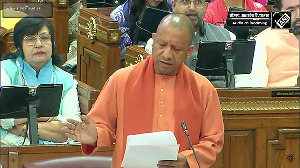Ahead of crucial talks between the government and opposition parties to resolve the deadlock over his constitutional amendments, Pakistani President Pervez Musharraf has said he would like to hold both the posts of chief of army and president for five years.
"I am not giving up the uniform," Musharraf said on the key opposition demand that he should quit as chief of army and give up his right to dismiss the parliament as a compromise for them to accept his presidency.
Musharraf said he "realised that the president and the army chief slots should not be held by the same person," but implored the media "to please leave the issue when I will be one and not the other to my judgment."
However, the president, addressing newspaper editors on Thursday night, said he was willing to compromise on other issues.
"I have a major role to play in uniform," Musharraf said, adding that in view of domestic and external compulsions, he had recently spoken to the chiefs of air force, navy and army commanders. "If I am not in uniform I can't have access to
them," he said.
Mushharraf said he wanted "to remain president and army chief for five years because by the end of that time the situation should have improved," to enable him to relinquish charge of the army.
"I won't stretch it unnecessarily. I will take a very realistic view," he said.
When pressed further whether there was a situation in which he might consider taking off his uniform as chief of army he said "a date before five years is possible."
At the same time, Musharraf said he was willing to be flexible when asked whether his hard-line stance would not effect talks between Prime Minister Mir Zafaruallah Khan Jamali and opposition parties.
"There are some flexibilities in this contentious area and there is no reason why a meeting ground cannot be found," he said adding "leave it to me. Don't bind me on this. On other issues there is flexibility."
Musharraf, however, ruled out any compromise with former prime ministers Benazir Bhutto and Nawaz Sharif: "What is their character. Their members of the national assembly seek guidance from outside - from Bhutto and Sharif - who don't talk of Pakistan but only about their personal interests."
He accused the middle rung leaders of both the parties of being "plunderers and looters" and ruled out the return from exile of Bhutto and Sharif.
Musharraf also declined to release Bhutto's husband, Asif Ali Zardari, who was in prison for over six years without any judicial conviction and said Sharif was sent into exile to Jeddah "on his volition."
Musharraf told the editors: "Let me tell you the Sharifs begged to be allowed to go. I didn't ask them to go. Look at the photos of them on the eve of their departure and on arrival in Saudi Arabia. They look so happy. I was pressurised to send them away."
On Zardari, he attributed the delay in dispensing justice to the courts and insisted that his government had not interfered in the process in any way. He denied that the government has written off cases against him.
He reacted angrily when asked whether the US would target Pakistan next after Iraq. "Why do we have this complex. We will not even be 100 on any such list. We are a nuclear and missile power, and we do not seek a confrontationist role in world affairs in our own best national interest."
Denying that the inspection by a team of international experts in a chemical factory will be the beginning of inspections for weapons of mass destruction in Pakistan, he said it is a "routine inspection" and has nothing to do with WMD.






 © 2025
© 2025